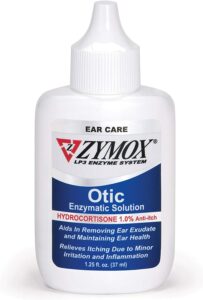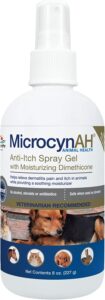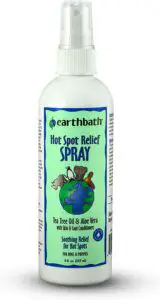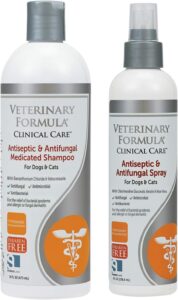8 Best Antifungal Sprays for Dog Yeast Infection – Tips on How to Deal with It

You’re having a wonderful time with your dog when you unexpectedly notice they seem bothered. They’re visibly scratching and itching, and there’s an odd smell emanating from their skin. It could be that your pet is experiencing a yeast infection on their skin.
While this can be a threat to his health, there is a way to treat and even prevent yeast infections in dogs. Thanks to the manufacture of dog yeast infection sprays, this medical condition can now be dealt with properly.
Be guided on what you should know about the infection, its remedy, and how to pick the best antifungal spray.
Our Top Pick would be PawZ’s SaniPaw Paw Sanitizer Spray is the best dog yeast infection spray.

Best Antifungal Sprays for Dog Yeast Infection
Here are our top picks:
-
- PawZ’s SaniPaw Paw Sanitizer Spray (Best Dog Sanitizer Spray Overall)
- Davis Chlorhexidine Spray for Dogs and Cats (Best Chlorhexidine Dog Spray)
- Pet King Brands Zymox Hydrocortisone-Content Ear Solution (Best for Ear Infections)
- ProSense Itch Solutions Spray (Best for Itchy Skin)
- Scout’s Honor Probiotic Itch Relief (Best Itch Reliever)
- Manna Pro MicrocynAH Anti-itch and Moisturizing Spray Gel (Best Anti-Itch with Moisturizer Spray)
- Earthbath Hot Spot Relief Soothing Spray (Best Soothing Relief for )
- Veterinary Formula Clinical Care Shampoo/Spray (Best Combo Antifungal Shampoo and Spray)
Best Dog Yeast Infection See Amazon.com for the best selection and value. #commissionsearned
Before delving into each one of these, let’s have an overview of a dog yeast infection first.
Yeast Infections in Dogs
If you spotted black itchy spots on your dog’s skin, then it’s affirmative to be a yeast infection.
Oftentimes, yeast infection occurs if your dog has a compressed immune system or when it is suppressed with medicine.
The yeast infections tend to develop in his paws and in his skin folds, ears, hind end, and armpits. They may not be contagious, yet they can make his skin itchy and may become worst if taken for granted.
The infections are more likely to occur during the seasonal allergies, especially if he has been taking antibiotics or steroids for a long time, or can cause by food allergies.
Long-term administration of steroids and medical issues may decrease his immune system. Therefore, the growth of yeast proliferates.
Causes of Dog Yeast Infections
The yeast called Malassezia naturally lives on the skin of canines, in their anal sacs and ears.
This can be checked in a dog with a healthy immune system. The yeast irritates their skin causing dermatitis when it grows out of control.
Some dog breeds tend to develop yeast infections based on their body traits or genetics. There are also those who are susceptible to the infection. Among them are as follows:
- Llasa apsos
- Spaniels
- Dachshunds
- Shih tzus
- Basset hounds
- Terriers
- Chihuahuas
- Poodles
- West highland white terriers
Yeast infection on ears is caused by the downward plunging in your dog’s ear canal. This serves as a favorable growth environment for yeasts.
You can use a dog ear cleaner solution to help to keep your dog’s ear always clean.
Another cause of the infection is the trapped debris or water in the canal. Allergens such as mold, smoke, certain foods, dust, cigarette, pollens, feathers, and cleaning products are the other reasons.
The fungal infection can also be found elsewhere in the dog’s skin, especially skin folds which may cause redness, crustiness, or scabies, accompanied by foul odor.
There are also some causes that any pup can contract dog fungal infection. Common among these infectious causes are:
- Antibiotics – Antibiotics get rid of good and bad bacterias, allowing the numbers of yeast to increase.
- Steroid medications – These medications are given to dogs to treat their autoimmune allergies and disorders. However, the immune system’s overreaction can make it weak which makes your dog vulnerable to yeast infections.
- Allergies – Allergies to food, fleas, or other environmental substances make your dog’s skin oilier, leading to irritation. It is the allergic reaction that gets him infected.
- Underlying medical conditions – Medical issues like seborrhea oleosa and diabetes may trigger the yeast overgrowth in the body of your dog.
Yeast Infection in Dogs Signs and Symptoms
Just like in humans, yeast infection in dogs can be misery. Incessant scratching and itching are common signs of yeast overgrowth. Early stages of the infection may have the following signs:
- Scooting his butt alongside the carpet
- Tilting his head
- Rubbing his body against any furniture
- Biting any area while licking and scratching
- Vigorous head shaking
There are also symptoms upon the progress of yeast infection in dogs:
- Sores caused by scratching
- Skin thickening or darkening
- Rash or irritated, red skin
- Brown discoloration of his nails
- Ear discharges
- Smelly odor
Now, let’s narrow down the best dog yeast infection treatment options.
8 Best Antifungal Spray for Dog Yeast Infection Reviews
Get information about the top sprays for yeast infections
1. PawZ’s SaniPaw Paw Sanitizer Spray
Keep your pup from itching with PawZ’s SaniPaw Paw Sanitizer Spray which is environmentally friendly and safe to use. The antibacterial formula is designed for canines suffering from allergies.
It utilizes chlorine dioxide which sanitizes drinking water and any produce. As a cleaner, the spray is non-toxic not just for your furry buddy but so for the environment.
It is used after walks to deodorize and disinfect after stepping in grime and pee.
The formula won’t upset your dog’s tummy nor cause any adverse reaction when licked.
It is hypoallergenic making it great for yeast infection in dogs; especially for infections in dog’s paws.
It is antifungal, antiviral, and antibacterial. In fact, it can kill 99.99% of germs, alcohol, toxin, and other substances.
Specific Features:
- Grooming sanitizing spray
- Antibacterial and antifungal paw spray
- Yeast infection in dogs medicine
- Disinfectant
- Environmental-friendly formula
Pros
- Treats yeast infection in dogs
- Kills germs
- Free from alcohol, benzalkonium chloride, and other toxins
- Gets rid of pet odor
- Offers sanitation
- Environmental-friendly
- Great for all dog breeds
Cons
- Not safe for puppies
2. Davis Chlorhexidine Spray for Dogs and Cats
Relieve any ringworm, yeast, fungal, and bacterial conditions from your pet with Davis Chlorhexidine Spray for Dogs and Cats.
The non-stinging spray gives localized inflamed skin, insect bite, and hot spot relief.
It is safe to use for cats, too. The contents of the formula include phospholipid complex, polyoxyethylene sorbitan monolaurate, PCMX, chlorhexidine gluconate, purified water, and SDA 40.
Also, it combats skin issues related to microorganisms.
The spray is great to use for your dog between his baths, assisting to advance the healing process.
Specific Features:
- Chlorhexidine-containing Spray
- Ingredients are mixed chlorhexidine gluconate, phospholipid complex, PCMX, SDA 40, polyoxyethylene sorbitan monolaurate, and purified water
Pros
- Safe both for cats and dogs, including puppies and kittens
- Treats insect bites, hot spots, and inflamed skin
- Convenient to use as a spray
- Non-sting formula
- Speeds-up the healing process
Cons
- Not ideal for pets that have sensitive skin
3. Pet King Brands Zymox Hydrocortisone-Content Ear Solution
The enzymatic treatment Pet King Brands Zymox Hydrocortisone-Content Ear Solution is effective in supporting the natural defense mechanism of your buddy’s body.
This yeast infection ear spray suppresses harmful yeast, bacteria, and fungi.
Its ingredient hydrocortisone offers additional relief from itching and inflammation.
This is attributable to hydrocortisone’s unique properties which yield a powerful antimicrobial formula when combined.
This yeast infection ear medication needs to be administered once daily.
The treatment is non-invasive, and it requires no pre-cleaning. Here’s a guide to help you give your pup his daily meds.
It cures chronic and acute ear infections and safe for expansive use on a persistent infection.
Specific Features:
- Patented antimicrobial LP3 enzyme system
- Antibiotic that contains hydrocortisone
- No-sting formula
Pros
- Treating yeast infection in dog’s ears
- Clears ear secretions and strengthens healthy ears
- Offers a natural and safe alternative to antibiotics
- No side-effects
- Non-invasive
- Lessens itchy ears
Cons
- The hydrocortisone content may not work if it is used with the other topical ear cleansers or medications.
4. ProSense Itch Solutions Spray
Manage that yeast infection causing itchiness of your paw’s skin with ProSense Itch Solutions Spray. This is a non-stinging formula for itchiness among dogs.
Hydrocortisone is the ingredient of this non-stinging formula that mitigates inflammation.
The spray is appropriate for dogs of all breeds and sizes. It stops your canine from scratching his skin.
The itching spray is free from alcohol reducing inflammation. Temporarily, it relieves skin itching caused by irritation in the localized spots.
Specific Features:
- Itch solution spray
- Non-stinging formula
- Medication for inflammation
- Designed for adult dogs and cats
- Contains aloe vera
Pros
- Relieves skin scratching and itching
- Reduces skin inflammation
- Contains aloe vera formula
Cons
- Not advisable for pregnant pets or those with sensitive skin
5. Scout’s Honor Probiotic Itch Relief Spray
You have noticed your pup scratching and being irritated then you should give him Scout’s Honor Probiotic Itch Relief Spray.
The spray helps soothe, hydrate, and calm his itchy skin with lasting relief between his baths.
It is available in different scents including the dog of the woods (sandalwood vanilla), lavender, and honeysuckle.
There is also the fragrance-free variant which is hypoallergenic.
The day-to-day use offers a necessary boost of the formula’s probiotics.
It brings out the natural beauty of your pet when it is infused with colony-forming and live probiotic kefir culture.
This formula is appropriate for all skin conditions and types. Also, probiotics aid good bacteria calming the inflammation naturally. It even keeps bad bacteria from taking over.
This natural yeast infection spray is hypoallergenic and safe to use on pets with sensitive skin. It is great for dogs with chronic issues in the skin.
The spray does not have fragrances or alcohol, triclosan, parabens, and sulfates.
Specific Features:
- Anti-itch probiotic itch relief spray
- Hypoallergenic
- Vegan and animal-friendly
- Contains oatmeal
- Natural formula
Pros
- Safe to use
- Hypoallergenic
- Relieves itchiness
- Treat chronic skin issue
- Does not contain alcohol
Cons
- May be harmful to some dog breeds
6. Manna Pro MicrocynAH Anti-itch and Moisturizing Spray Gel
Relieve your pet’s itchiness caused by yeast infection with Manna Pro MicrocynAH Anti-itch and Moisturizing Spray Gel.
The spray gel alleviates the itchiness while it provides soothing moisture to the skin.
The formula comes with patented and original Microcyn Technology treating over 10 million animal and human patients’ infections.
The active ingredients of the spray gel include sodium hypochlorite, hypochlorous acid, and dimethicone.
It also has inactive ingredients such as sodium phosphate bicarbonate, water, water, and sodium sulfate.
It does not come with steroids, tea tree oils, antibiotics, and alcohol.
Also, it is safe for all species, skin types, and ages of dogs and cats.
Specific Features:
- Anti-itch spray gel
- Come with microcin technology
- Recommended by veterinarians
- Veterinarian recommended
Pros
- Relieves itchiness
- Good for dogs of all breeds, skin types, and ages
- No steroids, alcohol, and antibiotics
- Safe for use on any dog breeds
Cons
- May be harmful to dogs with existing skin issues
7. Earthbath Hot Spot Relief Soothing Spray
Give your pet a soothing relief from itchiness with Earthbath Hot Spot Relief Soothing Spray. The formula mitigates scratching skin irritation and hot spots.
It is combined with tea tree oil, organic aloe vera, and colloidal oatmeal.
It comes with coconut-derived and renewable plant conditioners and detanglers, vitamin E, citric acid, glycerin, and purified water.
They have soothing properties to help your dog feel comfortable.
The formula gets rid of pet odors in between baths. It re-moisturizes the coat and skin of your dog and imparts supple softness and healthy shine without residue.
Specific Features:
- Itch relief spray
- Designed for dogs aged 6 weeks and above
- Contains natural ingredients
- Good for dogs of any breed
Pros
- Naturally treats itchiness caused by infection
- Soothes skin
- Avoids irritation
- Prevents pain
Cons
- May not be suitable for puppies
8. Veterinary Formula Clinical Care Antifungal and Antiseptic Shampoo/Spray for Dogs
Are you worried about your dog’s hair loss or other skin problems? Let me guess! I think you’re looking for the best antibacterial or antifungal shampoo. If I’m right, then keep reading!
Veterinary Formula Clinical Care Shampoo/Spray is the perfect option to prevent hair loss, scaling skin, and oiliness.
It has ketoconazole benzethonium chloride as active ingredient in the formulation to treat ringworm and other types of fungal diseases by utilizing it.
Moreover, it comes at a very reasonable price and does not contain any harsh chemicals.
Benzethonium chloride and ketoconazole, which acts as an antifungal, are the primary components in this shampoo.
In addition, there are numerous possible triggers for bacterial skin infections, collectively referred to as “pyoderma.”
However, We decided that this shampoo is the best option for several reasons.
For example, The antifungal and anti-bacterial ingredients found in these medicinal dog shampoos can cure any wound in the skin caused by an injury or persistent scratching.
So, it is useful in treating infections caused by bacteria as well as those caused by fungi.
In addition, the shampoo has lanolin, which helps minimize skin flaking and stinging. Another ingredient in this spray or shampoo is aloe vera, which calms and heals irritated skin.
But Wait! Here are some problems with it! Let me explain! This shampoo doesn’t remove flea and tick topical medications.
Also, it does not produce as thick lather as some medicinal dog shampoos we tested. But Overall, it doesn’t matter over its all positive features.
Specific Features:
- Prevent hair loss, scaling skin, and oiliness.
- Contain Ketoconazole and benzethonium chloride to prevent from ringworm and fungal infection.
- No side effect due to absence of harsh chemicals.
- Antifungal and Anti-bacterial agent.
- Cure any wound in the skin
- Minimize skin flaking and stinging.
- Aloe vera in this shampoo calms and heals irritated skin.
Pros
- Antibacterial, antiviral, and antifungal properties are present.
- Contain components that are safe for use in veterinary settings
- Available in both spray and shampoo variants
- Does not remove topical medicines for fleas and ticks as washing would.
- Affordable Price
Cons
- According to reports, there is an aroma of flowers but not mentioned on the label
Now that you have the options to get the best dog yeast infection spray, you need some FAQs about the infection.
Management of Yeast Infection in Dogs
You need to manage the infection of yeast in dogs. Here are some suggestions for you:
1. Fix your dog’s itch
Make sure he is comfortable since yeast causes him to feel uncomfortable and itchy. You can do the following remedies:
- Rinsing with apple cider vinegar every day. Just fill a bottle with apple cider vinegar then stick it in the fur of your dog then squeeze. Massage it around his body to restore his healthy pH levels discouraging yeast to overgrow. Be sure to put it on every after a swim or bath.
- Get a mixture of coconut oil every week. Massage the yeasty areas with the mixture. Melt an extra virgin coconut oil in a glass bottle then add lemon essential oil.
- Soothe his yeasty ears with a green tea solution. However, it would be best not to touch the ears unless they are a mess.
2. Do not Feed the Yeast
Veterinarians suggest keeping carbohydrates and sugar out of your pup’s diet. Make sure heavy metals will not get into him.
When benign, a yeast lives peacefully with bacteria which does not become harmful to him.
There are instances when Candida grows out of control due to insufficient bacteria caused by antibiotic administration, etc.
Yeast loves eating sugar so control his intake of rice, oats, millet, corn, wheat, peas, and potatoes.
Instead, get him a raw diet as it does not contain a huge amount of carbohydrates. Try to switch his kibble diet to its raw counterpart. Limit his fruits to berries since they are low in sugar.
Meanwhile, yeast gobbles up heavy metals which pose threat to his health, although it’s good for the environment.
Heavy metals can get into him through vaccination, fish, pesticides, industrial waste, poor water quality, and pet foods.
Now, if your buddy already got a yeast infection, prevent any vaccination when it’s possible, do not give him fluoridated water, and feed him with organic food, a health diet.
3. Get Rid of the Yeast
Anti-fungal foods like olive leaf, caprylic acid, Pau D’arco, and garlic help destroy yeast and eliminate it from the body of your pet. Add food as much as his body can tolerate combating yeast infection.
Olive leaf breaks down the cell membrane of Candida with its fungal substance oleuropein giving the oil a bitter taste.
It manages and prevents yeast infections in dogs or yeast dermatitis when administered in powdered form at certain doses.
Ideally, the caprylic acid in his body directly treats the infection. It comes from MCT oil, giving a potential seizure treatment in dogs. Do not give him that much though to avoid diarrhea.
Proven to be anti-fungal, pau d’arco has naphthoquinones that kill fungi, viruses, and parasites. Its lapachol content kills yeast. Unfortunately, this is not safe for pregnant dogs.
Moreover, garlic contains anti-fungal properties other than good natural probiotics. It lessens Candida and releases allicin when exposed to air. Make sure that it uses organically-grown garlic.
4. Crowd Out the Harmful Yeast
This helps beneficial gut bacteria in kicking most of the yeast out. Establish a gut environment for your pet’s body that is not hospitable.
You can do this by protecting microbiomes, adding friendly bacteria, fighting yeast infection with yeast, and adding prebiotics.
Ensure that your best friend has a healthy gut population of bacteria so that yeast cannot grow out of control.
Among the common things which can harm the gut bacteria include toxins, thyroid medications, antibiotics, stress, and cortisone medications.
Add probiotics to the diet of your dog when the microbiome is nice for good bacteria. Typically, probiotics are dairy-based. But, be cautious if he is sensitive to dairy. There are also probiotics which are based on soil.
However, soil-based probiotics are spore-forming with their protective coating which makes them acid-, antibiotic-, and heat-resistant.
Use yeast to fight yeast infection, stopping it from crowding out the digestive tract and into the organs and bloodstream. It alleviates Candida inflammation and its colonization.
Keep in mind that probiotics live in the gut of your pet in a day or few days. You cannot stop at probiotics. Give him prebiotics to increase his bacteria growth.
They are a critical part of his fight against yeast infection and fiber can lower the mercury levels in his body and brain.
You should add food-based prebiotics like burdock root, chlorella, and dandelion root. Also, low-sugar berries are great for his diet.
Lastly, remove the heavy metals dumped by dead yeast into his body. Chlorella and sulfur-rich foods help in removing the heavy metals.
Among the other supplements with chelate heavy metals are citrus pectin, fulvic and humic acid, selenium, glutathione, and bentonite clay.
Conclusion
Yeast infections in dogs is possible at any time. There are many ways you can treat, manage, and prevent skin yeasts infection if you only have the proper knowledge.
Narrow down your list of the yeast infection sprays for dogs and choose the right one for your pet. You may even go for a yeast infection home remedies.
Our Top Pick
Based on our assessment, PawZ’s SaniPaw Paw Sanitizer Spray is the best dog yeast infection spray.
Its ingredients are effective and appropriate for the infection of your canine. It is good for all breeds of dogs and it’s environmentally friendly.
As you may notice its advantages and disadvantages, this product has it all for his health and care.
So, go ahead because you are now ready to get the best anti-fungal spray to treat your dog’s yeast infection.
Featured Image Source: Photo by Geo Chierchia on Unsplash.com








